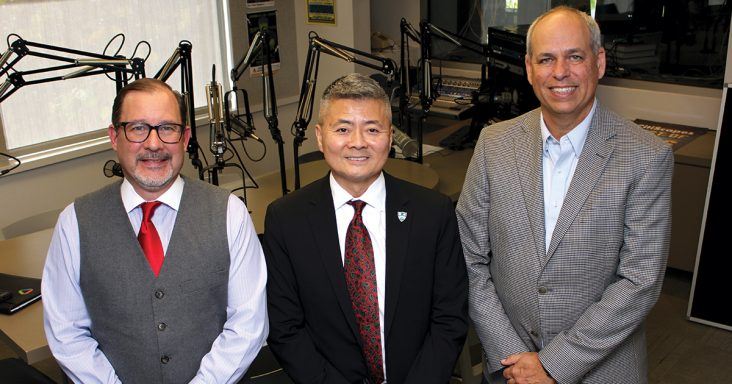Healthcare, insurance execs discuss ‘constant change’ in the industry
by November 21, 2019 5:06 pm 825 views

Photo cutline: From left, Raymond Raphael, managing principal and head of Arkansas operations for Georgia-based One Digital Health and Benefits; Brian Kim, president of the Arkansas Colleges of Health Education in Fort Smith; and Larry Shackelford, president and CEO of Washington Regional Medical Center in Fort Smith.
The healthcare industry is a world of constant change.
The technology, legislation, benefits — they are always evolving. Employers want to know what those changes are and how they’re going to affect their bottom line.
Three Arkansas healthcare and insurance leaders discussed those topics and others recently in a roundtable discussion in the Firmin-Garner Performance Studio at Fayetteville radio station KUAF 91.3 FM.
Participants in the conversation included Brian Kim, president of the Arkansas Colleges of Health Education [ACHE] in Fort Smith; Raymond Raphael, managing principal and head of Arkansas operations for Georgia-based One Digital Health and Benefits; and Larry Shackelford, president and CEO of Washington Regional Medical Center in Fayetteville.
They shared their thoughts on a number of topics, including recruitment strategies, telemedicine and the Affordable Care Act (ACA).
“We would love, from a price transparency, when someone’s admitted to the hospital, to be able to advise them as to what their cost is going to be,” Shackelford said. “But the reality is, the way the reimbursement works, is until we know their diagnosis, until we know what’s going on, then that amount isn’t determined on the front end. It’s on the back side. So I think we’re going to have to re-look at how we pay for care.”
Kim said one way to improve the ACA and its implementation is through education.
“I just bought insurance for my son who turned 26 this year,” he explained. “And when I was comparing premiums, my immediate instinct was to compare premiums with the premiums that I was paying through an employer subsidized. I don’t think many people look at the ultimate price of the insurance that the employer subsidizes for them to make a true comparison. Apples and apples and oranges and oranges.”
Raphael said the affordability side is the most important area to address.
“I think the best way to do that is transparency,” he said. “And the ACA has some provisions to address transparency. It’s working its way through the system. In my opinion, still very difficult for the average American to navigate.”
You can listen to their full conversation below.
